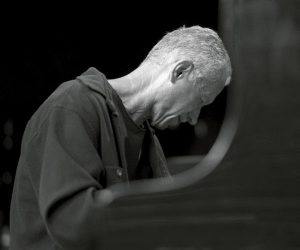Jazz Album Review: Keith Jarrett’s “Budapest Concert” — Crystalline Endgame
By Michael Ullman
My guess is that Keith Jarrett probably wasn’t satisfied with this performance. I wouldn’t change a note, a gesture, or a shading.
Keith Jarrett, Budapest (2-CD set, ECM)

Decades ago, in 1993, I asked pianist Keith Jarrett, for the sake of my students, what was his secret for being able to improvise endlessly. We were talking in his home in New Jersey. I had just noted how in his album Vienna Concert (ECM) he frequently seemed to flirt with lines rather than play them outright. As I said then (in World Monitor Magazine), Jarrett “suggests melodies that are never quite played; when he arrives at where he is heading, the section is over.” Jarrett’s response: “If I were to say how to go about improvising forever, it would be: Never play the subject. The subject is greater than anything you can ever play.” The subject becomes, oddly, the nail in the coffin for an improvisation. He talked about his solo concerts in which he went on stage, he hoped, with an empty mind. He just lets happen what would happen. Sometimes, by his own standards, he failed. Or became boring. He said something startling to me: “If it’s boring to you, maybe it’s also boring to me but I’m saying to myself, I better just find out what this is about. But what people so often make a mistake in thinking is that I’m free to play anything I want. But it’s not up to me.” Rather than arbitrarily change the subject, he stays where he was, musically, until a new idea emerges organically. His approach reminded me of something John Cage said — if you find a piece of music boring, play it again.
It’s been a rumor now for several years, but it is now confirmed that Jarrett’s astonishing, audacious, altogether unique career as a pianist is over: he has had two strokes and can no longer approach the piano. Everything he played — whether with saxophonist Charles Lloyd, with whom I first saw him, or playing electric behind Miles Davis, with his own quartets, or solo — he played responsibly, as if the music at hand mattered more than anything else at that moment. That music could be his own compositions or spontaneous inventions, the standards he elucidated so lovingly with his trio, or the compositions of Bach, Handel, and Shostakovich. His latest (last?) available recording is the two-CD live solo concert recorded in Hungary (on July 3, 2016) simply titled Budapest Concert. The performance consists of a dozen parts and two encores. Throughout the performance Jarrett is moving, however unconsciously, in a certain direction. Although Part Six, the midpoint, is a jaunty upbeat number whose opening reminded this listener of Thelonious Monk’s “Well, You Needn’t,” Jarrett seems to be gradually taken over by his lyrical, meditative side.

Pianist Keith Jarrett. Photo: Daniela Yohannes/ECM
It doesn’t start out that way. Part One seems to begin in the middle of a conversation. The composition opens with a thumping fragmentary statement. It’s a garrulous, thick-textured piece that takes place in between sudden pauses. Jarrett leaps back into the fray after every silence. In the middle of this 14-minute improvisation, two notes in the treble seem to stick their heads out suddenly like prairie dogs, and they become the organizing factor for the next few minutes, the subject hinted at and played with and around. Jarrett holds back a bit in Part Two, beginning with discreetly pedaled chords that suggest a melody or at least a direction toward a melody. Despite its spacious beginning, Part Three features ominous, dark chords, held by pedal, over which the right hand dances until around six and a half minutes, when it chooses to join the rumble via a huge tremolo. The piano seems about to explode. Finally the storm passes and Jarrett plays a few quiet notes as a kind of signal, a sense of an ending. With its obsessively repeated left-hand pattern in conversation with short improvised lines that always hold their own, Part Four is one of my favorites, as is the warmhearted next section, as gentle as a breeze. After the cheerful Part Six, we have such pieces as the lyrical Part Seven and the beautifully folksy melody of Part Eight, whose melody seems to emerge over another grand tremolo, in which Jarrett moves agilely up and down the keyboard. The finale of the bone-rattling Part Nine is so abrupt it seems to startle even the pianist, who laughs briefly.
Jarrett capped the regular part of his concert with a bright blues, which satisfies the toe-tapping members of the Hungarian audience. Then come two well deserved encores. The second is Jarrett’s exquisitely lyrical version of the 1954 Nat King Cole hit, “Answer Me.” Here, the pianist’s touch is so precisely varied, his dynamics so delicately terraced, and his sound simultaneously warm and bright that he attains an unnerving clarity. There’s adventure in this achievement as well — in the near grandiose swelling of the bridge, and the gentle subsidence until the arrival of the final crystalline reprise.
My guess is that Jarrett probably wasn’t satisfied with this performance. I wouldn’t change a note, a gesture, or a shading. I once asked Pat Metheny, who was already a star, who he thought was underrated as a jazz musician. He replied, “I know this sounds funny, because he is so famous, but Keith Jarrett.”
Michael Ullman studied classical clarinet and was educated at Harvard, the University of Chicago, and the U. of Michigan, from which he received a PhD in English. The author or co-author of two books on jazz, he has written on jazz and classical music for the Atlantic Monthly, New Republic, High Fidelity, Stereophile, Boston Phoenix, Boston Globe, and other venues. His articles on Dickens, Joyce, Kipling, and others have appeared in academic journals. For over 20 years, he has written a bi-monthly jazz column for Fanfare Magazine, for which he also reviews classical music. At Tufts University, he teaches mostly modernist writers in the English Department and jazz and blues history in the Music Department. He plays piano badly.

[…] Decades ago, in 1993, I asked pianist Keith Jarrett, for the sake of my students, what was his secret for being able to improvise endlessly. We were talking in his home in New Jersey. I had just noted how in his album Vienna Concert (ECM) he frequently seemed to flirt with lines rather than play them… Jazz Album Review: Keith Jarrett’s “Budapest Concert” – Crystalline Endgame – The Arts Fu… […]
Wonderful review, thank you. I wonder what Jarrett’s actual final recorded concert will be and if it will be released. I know already that it will be incredibly sad to hear.
Very much doubt it will be his last official release, ECM have too much in the vault, and even if it is they’re bound to be be plenty of unofficial bootlegs in the offing. I really hope he records something new, even if it’s with one hand, but that’s me being insensitive and greedy. If not, thank you Mr Jarrett for adding musical light to my life on an almost daily basis.
Beautiful writing. Cogent and exploratory, like fine music. It made me want to listen. Also, made me wonder if I can find a long, decidedly eccentric interview I did with Jarrett at his rural New Jersey home back in the ’80s.
Here is the quote from John Cage:
In Zen they say:
If something is boring after
two minutes,
try
it for four.
If still boring,
try it for eight,
sixteen,
thirty-two,
and so on.
Eventually one discovers that it’s not
boring at all
but very interesting.
What better way to enter the new glorious year of 2021, than to listen to Keith Jarrett’s music as I do today, specifically, The Koln Concert, while reading your insightful and wonderful words here. No better thing to do in any world that I know of, and so, thank you so much. I wish all of the very best that the future holds to you, and of course, to the man of the hour, our great and grand illustrious American genius. Keith Jarrett who traverses two centuries, and who is such a brilliant star of great magnitude, to us all of us who love him and his music so profoundly. Happy New Year, Michael Ullman, the very best to you always.